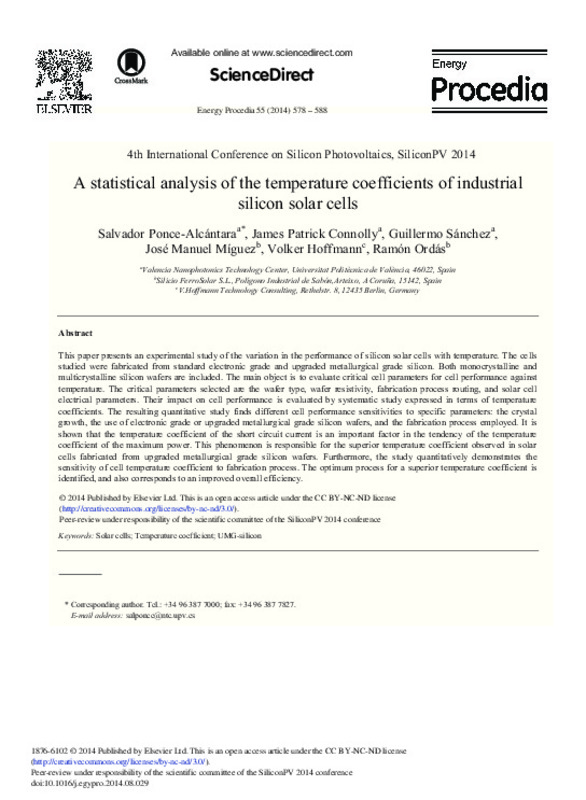JavaScript is disabled for your browser. Some features of this site may not work without it.
Buscar en RiuNet
Listar
Mi cuenta
Estadísticas
Ayuda RiuNet
Admin. UPV
A statistical analysis of the temperature coefficients of industrial silicon solar cells
Mostrar el registro sencillo del ítem
Ficheros en el ítem
| dc.contributor.author | Ponce Alcántara, Salvador
|
es_ES |
| dc.contributor.author | Connolly, James Patrick
|
es_ES |
| dc.contributor.author | Sánchez Plaza, Guillermo
|
es_ES |
| dc.contributor.author | Minguez, José Manuel
|
es_ES |
| dc.contributor.author | Hoffmann, Volker
|
es_ES |
| dc.contributor.author | Ordas, Ramon
|
es_ES |
| dc.date.accessioned | 2016-03-29T12:09:06Z | |
| dc.date.available | 2016-03-29T12:09:06Z | |
| dc.date.issued | 2014 | |
| dc.identifier.issn | 1876-6102 | |
| dc.identifier.uri | http://hdl.handle.net/10251/62060 | |
| dc.description.abstract | This paper presents an experimental study of the variation in the performance of silicon solar cells with temperature. The cells studied were fabricated from standard electronic grade and upgraded metallurgical grade silicon. Both monocrystalline and multicrystalline silicon wafers are included. The main object is to evaluate critical cell parameters for cell performance against temperature. The critical parameters selected are the wafer type, wafer resistivity, fabrication process routing, and solar cell electrical parameters. Their impact on cell performance is evaluated by systematic study expressed in terms of temperature coefficients. The resulting quantitative study finds different cell performance sensitivities to specific parameters: the crystal growth, the use of electronic grade or upgraded metallurgical grade silicon wafers, and the fabrication process employed. It is shown that the temperature coefficient of the short circuit current is an important factor in the tendency of the temperature coefficient of the maximum power. This phenomenon is responsible for the superior temperature coefficient observed in solar cells fabricated from upgraded metallurgical grade silicon wafers. Furthermore, the study quantitatively demonstrates the sensitivity of cell temperature coefficient to fabrication process. The optimum process for a superior temperature coefficient is identified, and also corresponds to an improved overall efficiency. | es_ES |
| dc.language | Inglés | es_ES |
| dc.publisher | Elsevier | es_ES |
| dc.relation.ispartof | Energy Procedia | es_ES |
| dc.rights | Reconocimiento - No comercial - Sin obra derivada (by-nc-nd) | es_ES |
| dc.subject | Solar Cells | es_ES |
| dc.subject | Temperature Coefficient | es_ES |
| dc.subject | UMG-silicon | es_ES |
| dc.title | A statistical analysis of the temperature coefficients of industrial silicon solar cells | es_ES |
| dc.type | Artículo | es_ES |
| dc.identifier.doi | 10.1016/j.egypro.2014.08.029 | |
| dc.rights.accessRights | Abierto | es_ES |
| dc.contributor.affiliation | Universitat Politècnica de València. Departamento de Ingeniería Electrónica - Departament d'Enginyeria Electrònica | es_ES |
| dc.contributor.affiliation | Universitat Politècnica de València. Instituto Universitario de Tecnología Nanofotónica - Institut Universitari de Tecnologia Nanofotònica | es_ES |
| dc.description.bibliographicCitation | Ponce Alcántara, S.; Connolly, JP.; Sánchez Plaza, G.; Minguez, JM.; Hoffmann, V.; Ordas, R. (2014). A statistical analysis of the temperature coefficients of industrial silicon solar cells. Energy Procedia. 55:578-588. doi:10.1016/j.egypro.2014.08.029 | es_ES |
| dc.description.accrualMethod | S | es_ES |
| dc.relation.publisherversion | http://dx.doi.org/10.1016/j.egypro.2014.08.029 | es_ES |
| dc.description.upvformatpinicio | 578 | es_ES |
| dc.description.upvformatpfin | 588 | es_ES |
| dc.type.version | info:eu-repo/semantics/publishedVersion | es_ES |
| dc.description.volume | 55 | es_ES |
| dc.relation.senia | 271934 | es_ES |








